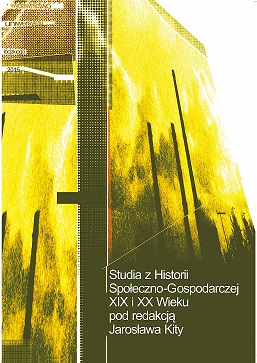Hierarchia czy demokracja? Wizja stosunków społecznych w miastach Królestwa Polskiego (na podstawie dyskusji o samorządzie miejskim w trakcie rewolucji 1905 roku)
DOI:
https://doi.org/10.18778/2080-8313.14.08Abstrakt
After the collapse of the January Uprising in 1863 the Kingdom of Poland experienced rapid industrialization and urbanization. When Warszawa, Łódź, Zagłębie and some smaller places became big industrial areas the ratio of urban population grew from 10% in 1870s to 30% in 1900. The scale of urbanization caused important social and political changes. The Revolution of 1905, considered as the first “urban revolution” in Eastern Europe was a result of those processes and initiated the era of modern politics and political discourse in Poland. One of new phenomena was an interesting discussion about planned urban municipality which was held between 1905 and 1907. The author analyses legal acts, press articles form Warszawa and Łódź and other sources in order to define three logics of urban social order presented by different political options and ideologists.
The oldest of them was the bourgeois one, which dependent the law of voting in urban elections and running in urban councils on the level of education and property to guarantee the dominant position of intelligentsia in the municipality. This argumentation presented by Adolf Suligowski, the author of the draft of new law from 1906, was criticized by members of Endecja and socialists who were convinced to their own logics of urban social order. While first of them considered urban population as divided between different nationalities, in socialists logic cities was mainly a battlefield between antagonist social classes and were not interested in cooperation with different groups.
All this ideological divisions led to final failure of the Suligowski’s draft and enabled the Tsarist administration to overemphasize ethnic problems in Kingdoms urban areas and established the conflict between Poles and Jews the main principle of the new drafts. This helped Endecja, which turned during the Revolution from democratic movement into a xenophobic national party, to became the most influential party and established nationalistic logic of urban social order the most influential.
Pobrania
Opublikowane
Jak cytować
Numer
Dział
Licencja

Utwór dostępny jest na licencji Creative Commons Uznanie autorstwa – Użycie niekomercyjne – Bez utworów zależnych 4.0 Międzynarodowe.
Funding data
-
Narodowe Centrum Nauki
Grant numbers Nr UMO-2014/15/D/HS3/00411









